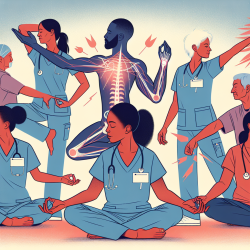Introduction
Chronic low back pain (CLBP) is a prevalent issue among nurses, often resulting from the physical demands of their profession. With prevalence rates ranging from 50% to 80%, it is a concern that not only affects the well-being of nurses but also impacts their ability to provide quality care. The research article "Mind-Body Exercises for Nurses with Chronic Low Back Pain: An Evidence-Based Review" highlights the potential of mind-body exercises, such as yoga and tai chi, as effective interventions for managing and potentially alleviating CLBP.
Understanding Mind-Body Exercises
Mind-body exercises integrate physical movements with mental focus and breathing techniques. These exercises aim to improve physical strength, flexibility, and mental well-being. Yoga and tai chi, two popular forms of mind-body exercises, have shown promise in reducing pain and disability associated with CLBP.
Benefits of Yoga and Tai Chi
- Physical Benefits: Both yoga and tai chi enhance muscular strength and flexibility, which are crucial for managing back pain. They also improve balance and postural control, reducing the risk of further injury.
- Mental and Emotional Benefits: These exercises help reduce stress, anxiety, and depression, which are often associated with chronic pain conditions. They promote relaxation and improve overall mental health.
- Holistic Approach: Unlike conventional treatments that may focus solely on physical symptoms, mind-body exercises address the interconnectedness of the body and mind, offering a comprehensive approach to pain management.
Implementing Mind-Body Exercises in Nursing Practice
For practitioners looking to improve their skills and provide better care for themselves and their patients, incorporating mind-body exercises into daily routines can be beneficial. Here are some steps to consider:
- Start Small: Begin with short sessions of yoga or tai chi, gradually increasing duration and complexity as comfort and proficiency grow.
- Seek Professional Guidance: Enroll in classes led by certified instructors to ensure proper technique and maximize benefits.
- Encourage Workplace Programs: Advocate for the implementation of mind-body exercise programs within healthcare settings to promote well-being among staff.
Encouraging Further Research
While the current evidence suggests positive outcomes from mind-body exercises, further research specifically targeting nurses with CLBP is needed. Practitioners are encouraged to engage in research initiatives and contribute to the growing body of knowledge in this area. By doing so, they can help establish more robust evidence and potentially influence healthcare policies and practices.
Conclusion
Mind-body exercises offer a promising avenue for managing chronic low back pain among nurses. By integrating these practices into their routines, nurses can enhance their physical and mental well-being, ultimately improving the quality of care they provide. To explore the detailed findings and implications of this research, please read the original research paper: Mind-Body Exercises for Nurses with Chronic Low Back Pain: An Evidence-Based Review.










